Former First Children Open Up About Life in the White House — from Navigating Secret Service to Attending Prom
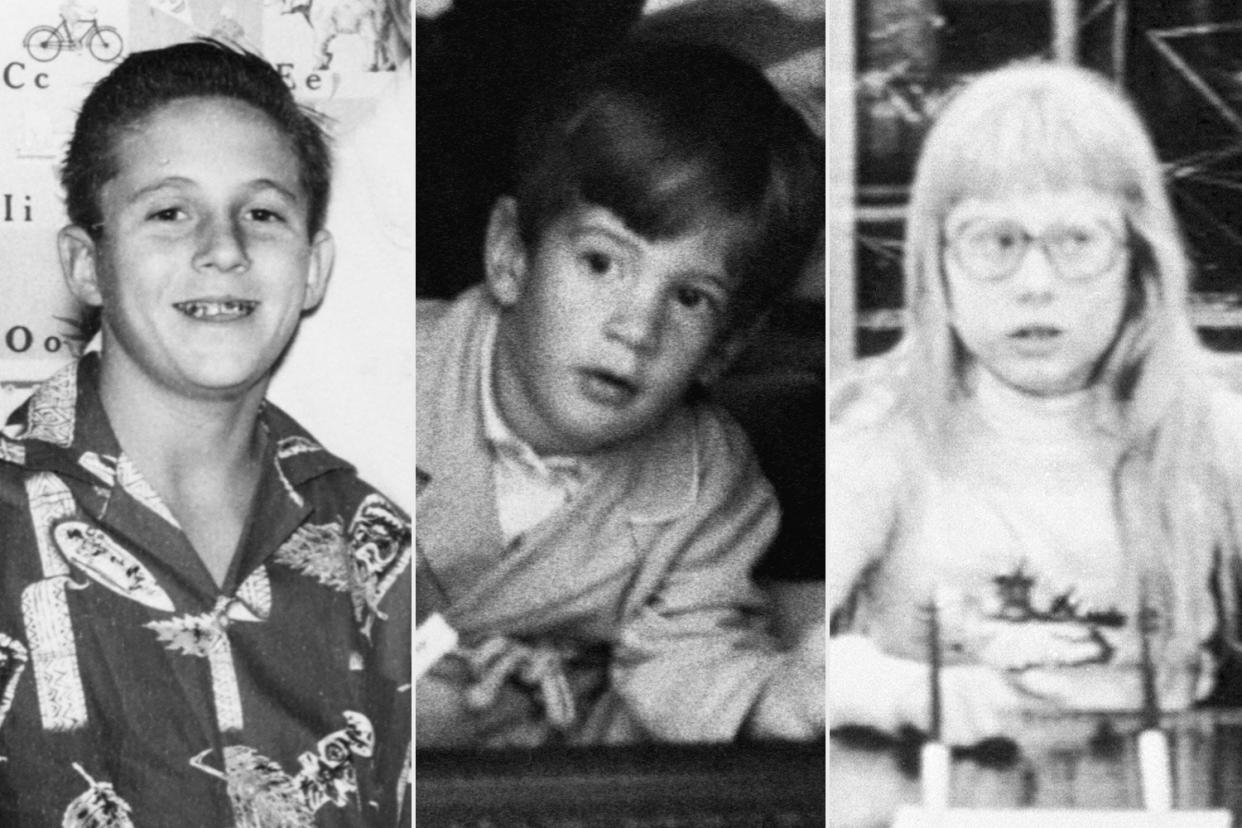
- Oops!Something went wrong.Please try again later.
- Oops!Something went wrong.Please try again later.
- Oops!Something went wrong.Please try again later.
- Oops!Something went wrong.Please try again later.
- Oops!Something went wrong.Please try again later.
- Oops!Something went wrong.Please try again later.
getty (3)
Much like first ladies, the first children are un-elected and unpaid — still, as with their parents, the office of the presidency always changes their lives.
Beyond that shared experience, each of their stories is their own. Some, like Joe Biden's son and daughter Hunter and Ashley Biden, are grown and living on their own; others, like Caroline and John F. Kennedy Jr., Amy Carter, Chelsea Clinton, Malia and Sasha Obama and Barron Trump, lived in the White House with their parents and attended school in Washington, D.C., under the eyes of the nation.
PEOPLE chatted with some of the 33 living first children to get an inside look at what it was really like.
Luci Baines Johnson was 16 on Nov. 22, 1963, the afternoon President John F. Kennedy was fatally shot and her father, Vice President Lyndon Johnson, was thrust into the Oval Office.
Luci Baines Johnson: My father was catapulted into the presidency by an assassin's bullet that put a hole in the heart of every living, breathing person on the face of the earth. It was devastating for so many, far and near.
President Kennedy was not only my president and my father's boss, but he was my personal friend — or at least he made me think that. [His death] was shattering on many levels. It was my first exposure on a personal level to violent death.
While Luci's father had been in politics for her entire life, nothing could have prepared her for being a first child. Luci says she had great empathy for the Kennedy children and was moved by the kindness of First Lady Jacqueline Kennedy while her husband was in office.
Luci Baines Johnson: It meant the world to me when Mrs. Kennedy invited me to a state dinner. I was dumbfounded. I felt like I was a wallflower invited by the president of the student body to go to prom.
RELATED: See White House Weddings Through the Years — Tricia Nixon, Alice Roosevelt & More
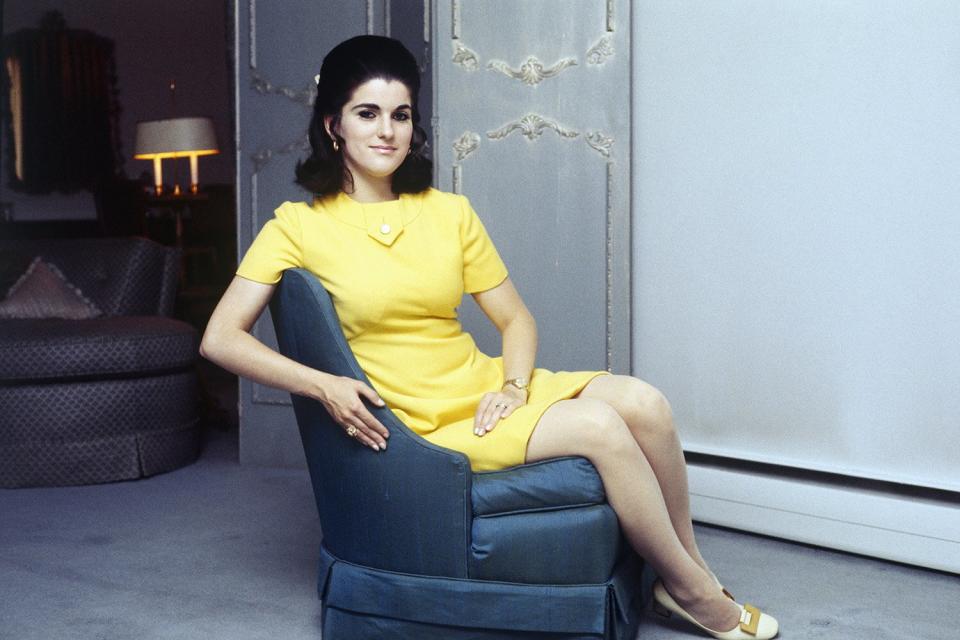
getty Luci Baines Johnson
Though under different circumstances, 17-year-old Susan Ford was also not expecting her father, Gerald Ford, to become president in 1974. On Aug. 9 of that year, facing impeachment and almost certain removal from office, Richard Nixon resigned, making Vice President Ford the 38th president of the United States.
Susan Ford: I was a senior in high school, and the lucky thing is we lived in Washington, so I didn't have to change schools like other president's children. My heart broke for Amy Carter, who had to move to Washington and make new friends and go to a new school. It's hard on those kids.

getty Amy Carter sits at President Jimmy Carter's desk in the Oval Office in a picture taken by her brother Jeff.
A perk of being a first child? Sometimes, you get to host major life events at the White House while your father is president. Luci's sister, Lynda Byrd Johnson, married in the East Room of the White House in 1967; Tricia Nixon married in the Rose Garden four years later.
For her part, Susan got to host her senior prom in the White House.
Susan Ford: It's really fun and hasn't been done since. It was kind of a fluke deal — I wasn't on the Prom committee, but they came to me at some point and said, "Can we have it at the White House?" So I went and talked to the head usher and he said, "Yes, as long as you all pay the expenses." We were able to have two bands. It was very cool. No question about it, it was very, very cool.
RELATED: Michelle Obama Says Sasha and Malia Became 'Midnight Bakers' — 'I Had to Tell Them to Stop!'
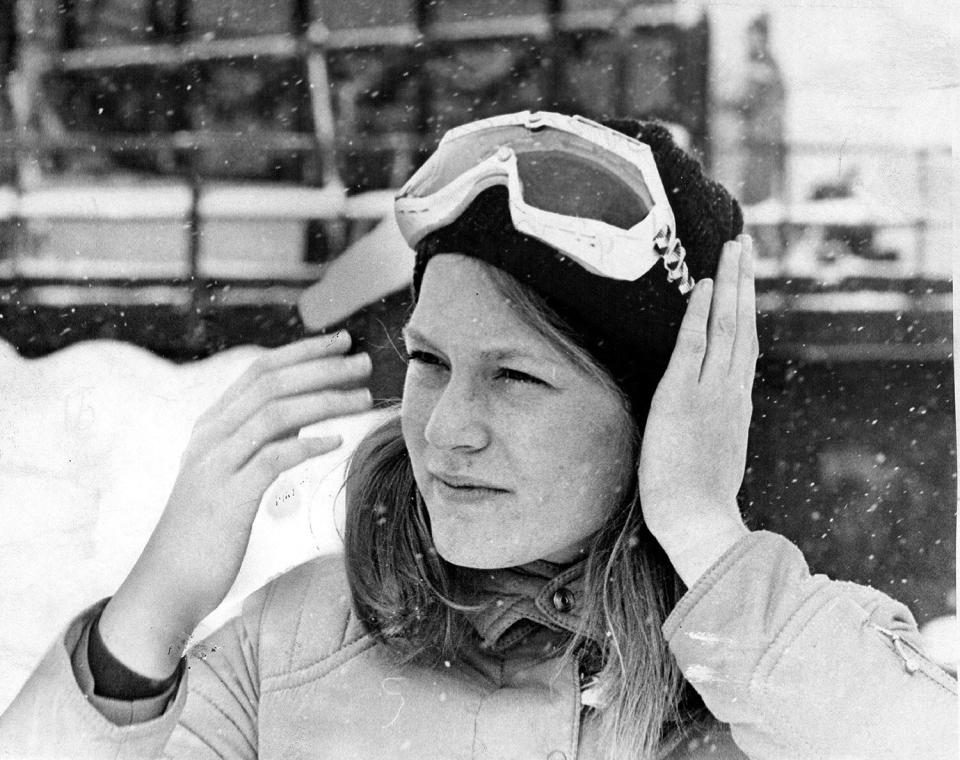
getty Susan Ford
When her mother, First Lady Betty Ford, was hospitalized for breast cancer, Susan took over as White House hostess.
Susan Ford: My dad had a White House Diplomatic Corps reception and he needed a date, and I was his date. It was the same day we got Liberty, our golden retriever, and the first time I had ever worn long, white gloves. I learned a lot and got to dance with several different ambassadors. It was a unique thing, and I was proud to be there for my dad.
Michael Reagan was 35 when his father, Ronald Reagan, became president. Even though he was a grown man and not living inside the White House, being a first child impacted him significantly, especially when it came to Secret Service protection. Michael, by the time his father became president, was very used to his parents being famous: His mom is Academy Award-winning actress Jane Wyman, and his father's fame first came as an actor and later through politics, including serving as governor of California.
Michael Reagan: You think you're somewhat prepared for that whole life, but when [your father] becomes president of the United States, your world changes. All of the sudden the Secret Service comes into your life and is with you 24 hours a day. They were very nice, but you feel almost like an outsider in your own house. Your life changes. You lose all of your privacy. It's basically gone. You have to sit there and swallow it and say "Okay, this is what it is" and bear with it.
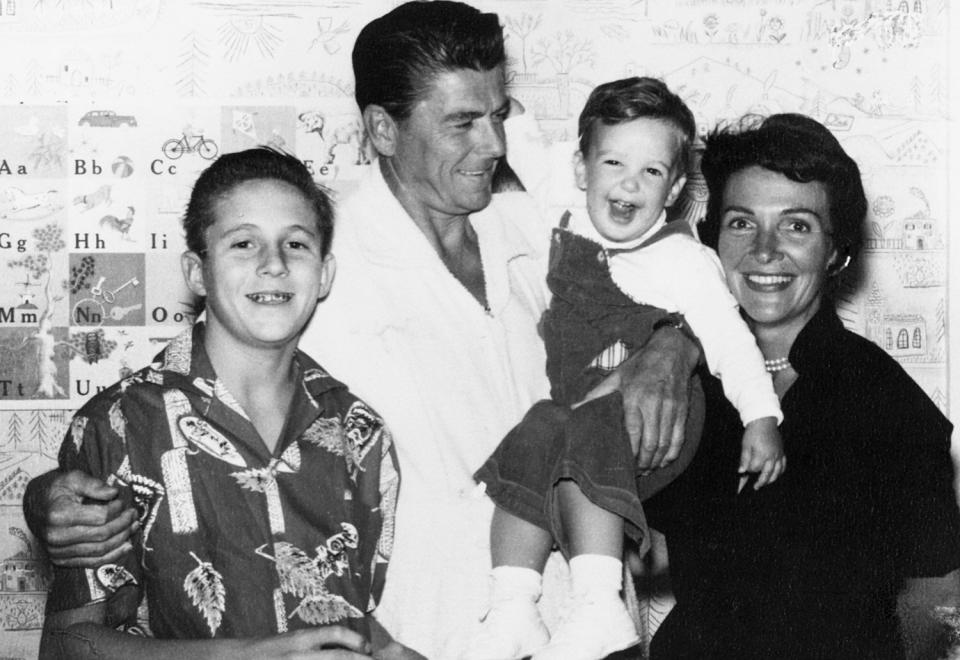
getty From left: Michael Reagan, Ronald Reagan, Ronald Reagan Jr. and Nancy Reagan
Another common thread with first families? Stories about the ubiquitous Secret Service.
Chelsea Clinton: I once was driving with my best friend from high school and we went through a light and like the Secret Service got caught behind the other light and we pulled over immediately of course, and waited for them. But I was like, "Oh my God, like I'm outside of their immediate line of sight for like two minutes." And I think I apologized for two weeks. I felt so horrible.
I used to be asked all the time, "Did you ever run away?" No, I never ran away … I respect that they had a job to do. I wasn't going to make that job harder for them, and I wasn't going to stress out my parents [Bill and Hillary Clinton] like that. Just never even occurred to me."
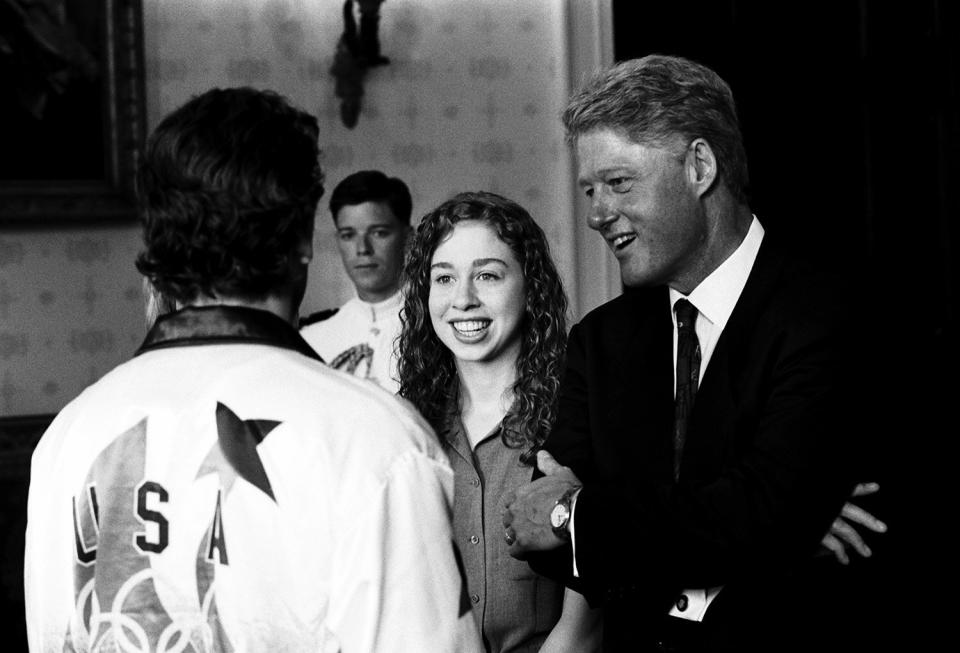
getty Center, from left: Chelsea Clinton and President Bill Clinton greet a member of the U.S. Olympic Team during a reception at the White House on Aug. 7, 1996.
Living in the public eye and being a first child certainly opens doors, but it can also be frustrating, especially in terms of lack of privacy.
Susan Ford: I had to live a very public life. Thank God there wasn't 24/7 news media like there is today — I would have been in so much trouble. It's bad enough that my dad could read the log to find out what time I got home. A teenager's worst nightmare is having the Secret Service. But they were nice guys and I respected them, and it's nice to be able to say we're still friends and still keep in touch.
Michael Reagan: Everyone wants to use you. I can't tell you how many times people came to me with a deal, and still do. Dad and I made it very clear, we talked about this early on: "You have to duck and cover."
I think my dad really understood it [the impact of the Secret Service in one's life]. He said "You don't want me at your house, because I'm a 26-car motorcade. If you want your neighbors to really dislike you, just have me drive by." The biggest hinge is your privacy completely disappears.
With our daughter Ashley, we found out her code name before we found out she was a girl. When she was being born, the first thing they said was "We have an arrival! Raindrop has arrived." I asked "Is [the baby] a boy or a girl?" and they said "Oh, it's a girl." Ashley now has a tattoo of raindrops on her foot.
The public remains fascinated by first children. At the John F. Kennedy Presidential Library and Museum in Boston, an exhibit opened Aug. 1 spotlighting Caroline and John F. Kennedy Jr.
Alan Price, John F. Kennedy Presidential Library and Museum director: People may not remember that when President Kennedy came into office, it was the first time the American public had seen young children in the White House since Grover Cleveland. Through the media of that day — magazines, television, newspapers — suddenly the White House became more accessible and people were, frankly, obsessed with John Jr. and Caroline. This exhibit is a bit of a time capsule snapshot of what that era was like and the public obsession with the children. Eleanor Roosevelt warned Mrs. Kennedy that it is very challenging to raise children in the White House. Mrs. Kennedy did her best to give them normalcy, even though it wasn't really possible.
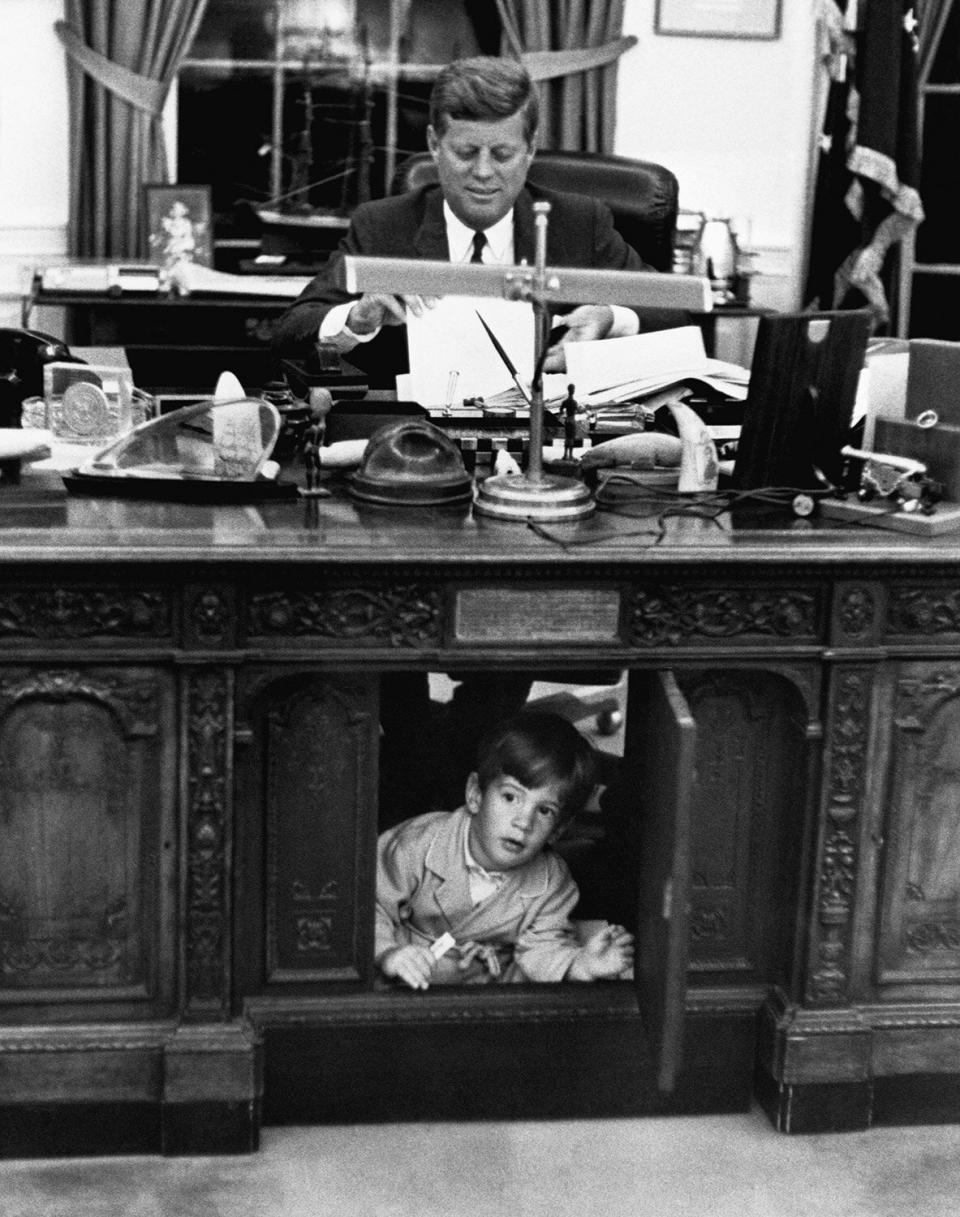
getty John F. Kennedy Jr. beneath dad John F. Kennedy's desk at the White House
RELATED VIDEO: What Melania Trump's Biographers Learned — 'More in It for Her to Stay Than to Go'
Twins Jenna and Barbara Bush — themselves the children of another first child, George W. Bush — were already off to college at the University of Texas and Yale University, respectively, when their dad became president.
Jenna Bush Hager: We didn't ever live there, which I think is the best part of it. We could visit, but also have our own lives, which I think is very healthy. But I think the biggest positive is living history and that our parents were so generous in allowing us to live history, that we got to travel with them all over the world and meet such incredible people.
Barbara Bush: Since we were young, that type of exposure really influenced what we thought we could do with our lives and what we thought we were capable of, in terms of choosing career paths and finding our purpose. That's so lucky to have at that age.
Both fiercely protective of their father, it hurt to see criticism of him, they said.
Jenna Bush Hager: It's hard to disassociate who you see as a person, as your father, who you adore, and then to have the world see him a different way. That's hard, but I think the good outweighs the bad.
Barbara Bush: I think the positive of the experience and the opportunity is so much bigger than any negative.
Never miss a story — sign up for PEOPLE's free weekly newsletter to get the biggest news of the week delivered to your inbox every Friday.
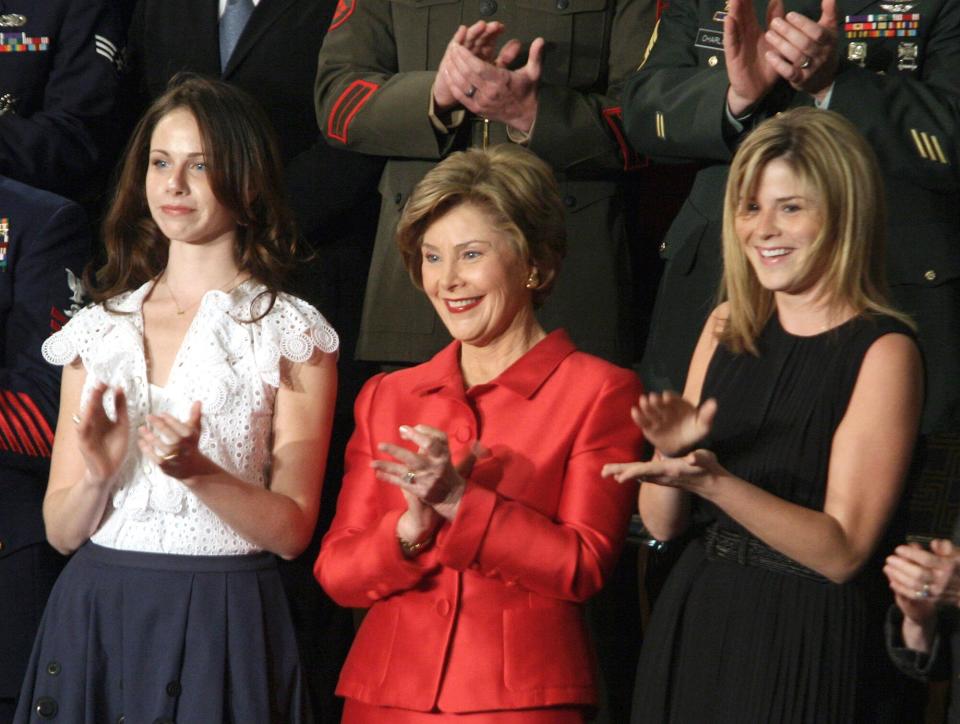
Getty From left: Barbara Bush, Laura Bush and Jenna Bush at President George W. Bush's 2008 State of the Union
Getting to witness history is another perk — such as it is — of the president's children. Luci Baines Johnson remembers that the Civil Rights Act of 1964 was signed on her 17th birthday.
Luci Baines Johnson: I got a handwritten note from my father on that day because he didn't have time to pick up a birthday card. Has anyone ever gotten a better birthday present? My father was president for five years, long enough for me to realize the extraordinary good fortune that was mine. It was an act of fate because of no achievement of my own. I was an eyewitness to history, and it changed my life for always and forever for the better.
Many of the 33 living first children say they are in touch, through holiday card exchanges and seeing one another at funerals for their parents. Their bonds cross party lines — it doesn't matter whether their father was a Republican or a Democrat, "there's a camaraderie about us no one else can touch," Susan Ford says.
Luci Baines Johnson: It's a fraternity of not just first children, but first families. There is a sense of "You've walked my walk, you know my history — you care." And whether a Democrat or a Republican is something that hasn't much mattered.
Susan Ford: We ask each other, "What room was your room? Who was there as housekeepers?" It's really the staff of the White House that makes a huge difference and makes it feel like a home. Those are the things that you have in common and can talk about with other people that lived there. The camaraderie with us is not about politics, it's about living there, about those who have had those experiences and can share them.
Luci Baines Johnson: These first families represent both sides of the aisle and love each other as fellow Americans. We had an opportunity to be an eyewitness to history, and it was the privilege of a lifetime, but the facts are, every member of the first family serves.
I sent a Christmas card to President and Mrs. Truman in 1968 of me holding my son in front of the White House. I wrote how so few could understand these circumstances, and I realized they truly did understand my parents' circumstances — not just the presidency, but becoming president in sudden and painful, agonizing circumstances as well, and that they made my father feel like he mattered by wanting to help him. I emphasized how much that meant to me. Not too long afterwards, I received a handwritten note from Mrs. Truman thanking me for what I had written her on the back of the Christmas card. If that doesn't tell you what first families mean to first families …
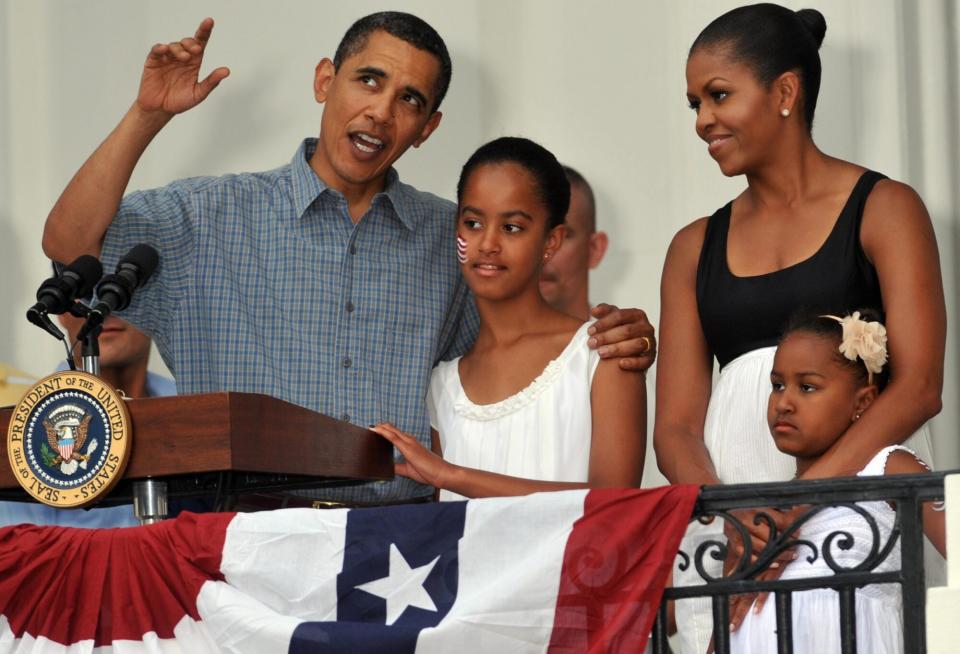
Getty From left: Barack, Malia, Michelle and Sasha Obama during an event to celebrate Independence Day and to honor military families on July 4, 2009.
Though certainly rife with challenges, overall being the child of a president is an opportunity to not only witness history but also to be given a platform to do good and to serve.
Michael Reagan: Good moments far outshine [any other]. You know, only 40 people had been president of the United States when my dad became president. We're pretty damn lucky.
Luci Baines Johnson: [Being a first child] gave me the greatest gift one could receive — a life of purpose. A life greater than myself.
* With reporting by SAM GILLETTE

